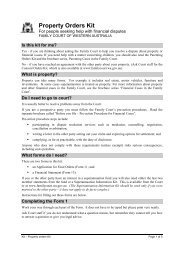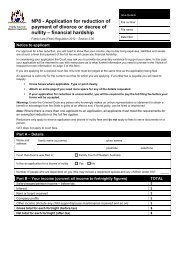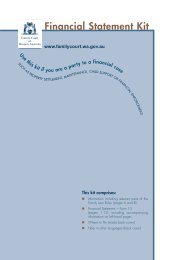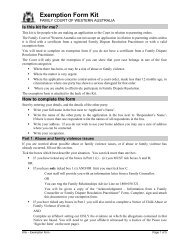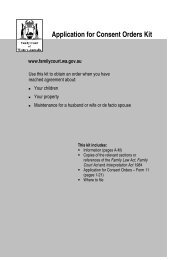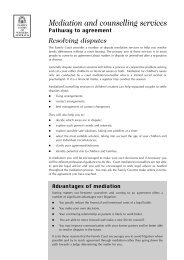FAMILY COURT OF WESTERN AUSTRALIA
FAMILY COURT OF WESTERN AUSTRALIA
FAMILY COURT OF WESTERN AUSTRALIA
You also want an ePaper? Increase the reach of your titles
YUMPU automatically turns print PDFs into web optimized ePapers that Google loves.
<strong>FAMILY</strong> <strong>COURT</strong> <strong>OF</strong> <strong>WESTERN</strong> <strong>AUSTRALIA</strong><br />
PRACTICE DIRECTION<br />
CHILD-RELATED PROCEEDINGS<br />
(No. 1 of 2006)<br />
1. APPLICATION AND COMMENCEMENT<br />
1.1 This Practice Direction applies only to the conduct of “child-related<br />
proceedings” within the meaning of the Family Law Act 1975 and Family<br />
Court Act 1997 and is to be read in conjunction with those Acts, the Rules<br />
made under those Acts (“the Rules”), and the Court’s Case Management<br />
Guidelines and Directions.<br />
1.2 To the extent of any inconsistency, this Practice Direction prevails over the<br />
Rules and the Court’s Case Management Guidelines and Directions for the<br />
conduct of child-related proceedings. In particular, Part 16A.2 of the Family<br />
Law Rules does not apply to cases to which this Practice Direction applies.<br />
1.3 This Practice Direction applies to cases started in and to be heard in, or cases<br />
transferred to, the Family Court of Western Australia, or Magistrates Court, in<br />
Perth.<br />
1.4 This Practice Direction commences on 1 July 2006.<br />
1.5 This Practice Direction applies to cases under the Family Court Act 1997 as<br />
though that Act has been amended to reflect the amendments to the Family<br />
Law Act 1975 made by the Family Law (Shared Parental Responsibility) Act<br />
2006 (Cth).<br />
2. FILING <strong>OF</strong> DOCUMENTS STARTING A CHILD-RELATED<br />
PROCEEDING CASE<br />
2.1 A Form 1 or Form 1A seeking parenting orders other than child maintenance<br />
or support (whether any other type of orders are also sought) is to be<br />
accompanied by a Client Information Form, a copy of which is attached to this<br />
Practice Direction.<br />
2.2 If interim orders are sought, a Form 2 is to be filed.<br />
Practice Direction No. 1 of 2006 - Page 1 - 1 July 2006
2.3 Affidavits in support of a Form 2 will not be accepted for filing unless the<br />
Court gives permission.<br />
2.4 Permission to file an affidavit is to be sought by providing the affidavit and a<br />
letter addressed to the Duty Registrar setting out the reasons relied upon with<br />
reference to the affidavit sought to be filed. Permission will not usually be<br />
given unless the case is listed on an ex parte basis.<br />
2.5 Affidavits are not to be filed with a Form 2A unless an affidavit has been<br />
accepted for filing in support of the Form 2 or permission to file that affidavit<br />
is given.<br />
3. LISTING PROCEDURES<br />
3.1 Applications starting a case seeking parenting orders will be listed to a case<br />
assessment conference as soon as practicable after 28 days from the date of<br />
filing.<br />
3.2 A listing earlier than 28 days from the date of filing is to be sought by letter<br />
addressed to the Duty Registrar setting out the reasons relied upon. Unless the<br />
case is listed on an ex parte basis, the case will usually be listed to an urgent<br />
case assessment conference.<br />
4. CASE ASSESSMENT CONFERENCES<br />
4.1 Except as set out in paragraph 8 of these Practice Directions case assessment<br />
conferences will be conducted by a Family Consultant.<br />
4.2 Evidence of anything said to a Family Consultant is admissible in court.<br />
4.3 At the case assessment conference the Family Consultant will:<br />
(i)<br />
(ii)<br />
(iii)<br />
(iv)<br />
conduct a screening and assessment of the case;<br />
where possible assist the parties to reach agreement on all or<br />
part of their case;<br />
seek to identify the relevant issues in the case; and<br />
consider appropriate case management options.<br />
4.4 At the conclusion of the case assessment conference the case will be referred<br />
to a Magistrate for an immediate case assessment hearing.<br />
Practice Direction No. 1 of 2006 - Page 2 - 1 July 2006
5. CASE ASSESSMENT HEARINGS<br />
5.1 Case assessment hearings will usually take place in a courtroom. A Magistrate<br />
may however conduct the hearing in a conference room if it is considered<br />
appropriate.<br />
5.2 At a case assessment hearing the Court may:<br />
(i) make any orders the terms of which are agreed;<br />
(ii) receive evidence from the parties and/or the Family Consultant;<br />
(iii) restrain the parties by injunction from filing any applications in<br />
the case without permission;<br />
(iv) identify and record the relevant issues in dispute between the<br />
parties;<br />
(v) determine if an interim hearing is required and make<br />
appropriate procedural orders for that hearing;<br />
(vi) make orders regarding the filing of affidavits and the issues to<br />
be dealt with in the affidavits;<br />
(vii) make any appropriate orders regarding allegations of child<br />
abuse or family violence;<br />
(viii) appoint an independent children’s lawyer;<br />
(ix) allocate the case to the appropriate track in accordance with<br />
paragraph 6;<br />
(x) allocate a Case Coordinator to the case; and<br />
(xi) allocate the next court event.<br />
5.3 Unless otherwise ordered, the parties shall sit at the bar table during a case<br />
assessment hearing.<br />
5.4 At this hearing unless otherwise requested the parties and their lawyers may<br />
remain seated whilst addressing, or being addressed, by the Court.<br />
6. ALLOCATION <strong>OF</strong> CASE TO A TRACK<br />
6.1 A case may be allocated to the “Judge Track”, “Magistrate Track” or<br />
“Consultant Track”.<br />
6.2 A case may be allocated to the Judge Track where it appears:<br />
(i)<br />
(ii)<br />
(iii)<br />
(iv)<br />
(v)<br />
(vi)<br />
the estimated final hearing time for the case exceeds 2 days;<br />
the case involves international or interstate relocation of a<br />
child;<br />
the case involves international issues such as jurisdiction;<br />
the case involves familicide or homicide;<br />
a Magistrate does not have jurisdiction to hear the case; or<br />
the issues in the case are of a nature that would otherwise make<br />
it appropriate to be heard by a Judge.<br />
Practice Direction No. 1 of 2006 - Page 3 - 1 July 2006
6.3 A case may be allocated to the Consultant Track where it appears that the<br />
intervention of a judicial officer is not required at that time.<br />
6.4 A case may be otherwise allocated to the Magistrate Track.<br />
6.5 A case may be allocated to a different Track at any stage by order of direction<br />
of a Judge, Magistrate or Registrar.<br />
6.6 As far as practicable:<br />
(i)<br />
(ii)<br />
(iii)<br />
the Family Consultant who conducts the case assessment conference<br />
will remain allocated to that case until it ends;<br />
if the case is allocated to the Magistrate Track the Magistrate who<br />
conducts the case assessment hearing will remain allocated to that case<br />
until it ends; and<br />
if the case is allocated to the Judge Track, the List Judge shall allocate<br />
a Judge to the case and that Judge shall remain allocated to that case<br />
until it ends.<br />
7. FILING <strong>OF</strong> SUBSEQUENT APPLICATIONS<br />
7.1 After a case has started, a party may not file an application in that case without<br />
permission.<br />
7.2 Permission to file an application is to be sought by letter addressed to the Case<br />
Coordinator setting out the reasons relied upon together with a copy of the<br />
application sought to be filed.<br />
7.3 If practicable the request for permission to file an application will be<br />
determined by the Judge or Magistrate allocated to the case upon referral of<br />
the request from the Case Coordinator.<br />
7.4 Affidavits in support of subsequent applications will not be accepted for filing<br />
without permission. Permission will not usually be given unless permission is<br />
given for the application to be listed on an ex parte basis.<br />
Practice Direction No. 1 of 2006 - Page 4 - 1 July 2006
8. APPLICATIONS FOR CHILD SUPPORT/MAINTENANCE OR<br />
ALLEGED CONTRAVENTION <strong>OF</strong> A PARENTING ORDER<br />
8.1 If no other child-related proceedings are pending, applications starting a case<br />
relating to:<br />
(i)<br />
(ii)<br />
child maintenance or support will be listed to a case assessment<br />
conference before a Registrar as soon as practicable after 28<br />
days from the date of filing;<br />
alleged contravention of a parenting order will be listed to a<br />
case assessment conference before a Registrar as soon as<br />
practicable after 14 days from the date of filing.<br />
8.2 Paragraphs 2, 3, 4, 5 and 6 of these Practice Directions do not apply to such<br />
cases.<br />
8.3 An affidavit in support of such application will be accepted for filing.<br />
8.4 At the case assessment conference the Registrar may:<br />
(i)<br />
(ii)<br />
(iii)<br />
(iv)<br />
(v)<br />
(vi)<br />
make any orders the terms of which are agreed;<br />
assist the parties to resolve all or part of the case;<br />
identify the issues relevant to the case;<br />
make directions as are appropriate to ensure the matter is ready<br />
for hearing on the relevant issues;<br />
limit the evidence to be relied upon and the time of any<br />
hearing; and<br />
allocate a hearing for the case.<br />
CHIEF JUDGE<br />
27 JUNE 2006<br />
Practice Direction No. 1 of 2006 - Page 5 - 1 July 2006


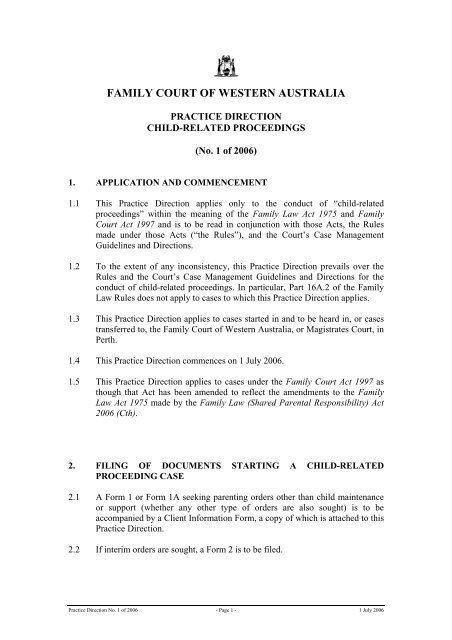
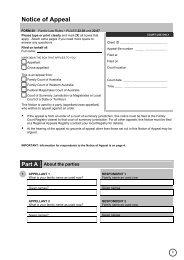
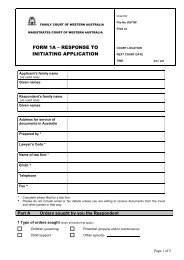
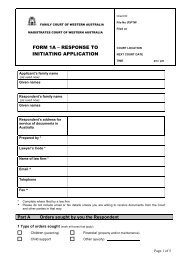

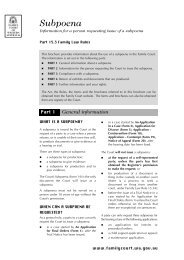
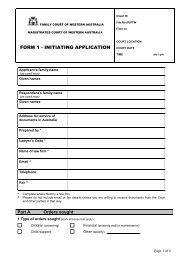
![Y and M [2007] - Family Court of Western Australia](https://img.yumpu.com/46403729/1/184x260/y-and-m-2007-family-court-of-western-australia.jpg?quality=85)

